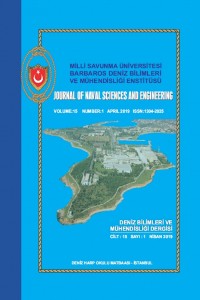Abstract
Referring 3rd IMO GHG study maritime
transport is responsible for about 2.5% of global greenhouse gas (GHG)
emissions emitting around 940 million tons of CO2 annually. This emission
figure is projected to increase significantly if serious mitigation measures
are not put in place. Thanks to the studies conducted by IMO GHG emissions from
international shipping to be reduced, actually the projection of the reduction
amount is 50% achieved by 2050 compared to 2008. Today, navy vessels are not responsible
for the IMO emission regulations as commercial vessels, but special regulations
may appear in the future. Therefore energy analysis can be needed also for the
naval vessels in the future. In this paper, the initial step for performing a
ship energy system analysis, which is called “Reference Energy System”, has
been developed for a generic frigate. The aim of this work is to provide to
open a window for energy analysis of naval platforms.
Keywords
Ship Energy System Analysis Reference Energy System Frigate Emission Control Areas Greenhouse Gases
References
- Baldi F. (2016). “Modelling, analysis and optimization of ship energy systems,” Doctoral dissertation, Dept. of Shipping and Marine Technology, Chalmers University of Technology, Gothenburg, Sweden.
- Sulukan E., Özkan D., Sarı A., “Reference Energy System Analysis of a Generic Ship”, Journal of Clean Energy Technologies, Vol. 6, No. 5, 2018.
- Eyring V., Köhler H.W., Lauer A., Lemper B., Emissions from international shipping: 2. Impact of future technologies on scenarios until 2050, J. Geophys. Res. 110 (2005) D17306.
- Corbett J.J., Köhler H.W. (2003). Updated emissions from ocean shipping, J. Geophys. Res.108 (D20) 1–13.
- IMO, Third IMO GHG Study, Executive Summary and Final Report, 2014.
- Shell Report. (2019). https://www.shell.com/business-customers/marine/ imo-2020.html.
- DNV GL (2018). “Understanding IMO 2020”, Macquarie Research.
- Buhaug et al. (2009). Second IMO GHG Study 2009 Update of the 2000 GHG Study: Final Report Covering Phrases 1 and Phrases 2, IMO, London.
- Cames et al. (2015). Emission reduction targets for international aviation and shipping. [Online]. Available: http://www.europarl.europa.eu/ RegData/etudes/STUD/2015/569964/IPOL_STU(2015)569964_EN.pdf
- Heaps, C.G. (2016). Long-range Energy Alternatives Planning (LEAP) system. [Software version: 2018.1.20] Stockholm Environment Institute. Somerville, MA, USA. https://www.energycommunity.org
- Kydes, A.S., Kanudia A., Loulou R. (2004). “National Energy Modeling Systems”, Encyclopedia of Energy, Volume 4, 89-109.
Abstract
IMO’nun
3. sera gazı emisyonu çalışmasına göre deniz taşımacılığı yılda yaklaşık 940
milyon ton CO2 gazı salmakta ve bu da küresel sera gazı salımının (emisyon)
yaklaşık %2.5’u kadardır. Ciddi önemler alınmadığı takdirde bu rakamların önemli
ölçüde artacağı tahmin edilmektedir. IMO’nun yaptığı çalışmalarda, 2008 yılına
kıyasla 2050 yılında deniz taşımacılığı kaynaklı sera gazı salımlarının %50
azalması hedeflenmektedir. Günümüzde donanma gemileri ticari gemiler gibi IMO’nun
kısıtlamalarından sorumlu tutulmasa da gelecekte bu gemilere özel kısıtlamalar
getirilebileceği değerlendirilebilir. Bu çerçevede donanma gemilerine yönelik
enerji analizinin yapılması faydalı olacaktır. Bu çalışmada genel bir fırkateyn
için gemi enerji analizinin gerçekleştirilmesinde ilk basamak olan Referans
Enerji Sistemi çalışması yapılmıştır. Çalışmanın amacı askeri deniz platformlarının
enerji analizi için bir pencere açılmasını sağlamaktır.
Keywords
Gemi Enerji Sistemi Analizi Referans Enerji Sistemi Fırkateyn Emisyon Kontrol Alanları Sera Gazları
References
- Baldi F. (2016). “Modelling, analysis and optimization of ship energy systems,” Doctoral dissertation, Dept. of Shipping and Marine Technology, Chalmers University of Technology, Gothenburg, Sweden.
- Sulukan E., Özkan D., Sarı A., “Reference Energy System Analysis of a Generic Ship”, Journal of Clean Energy Technologies, Vol. 6, No. 5, 2018.
- Eyring V., Köhler H.W., Lauer A., Lemper B., Emissions from international shipping: 2. Impact of future technologies on scenarios until 2050, J. Geophys. Res. 110 (2005) D17306.
- Corbett J.J., Köhler H.W. (2003). Updated emissions from ocean shipping, J. Geophys. Res.108 (D20) 1–13.
- IMO, Third IMO GHG Study, Executive Summary and Final Report, 2014.
- Shell Report. (2019). https://www.shell.com/business-customers/marine/ imo-2020.html.
- DNV GL (2018). “Understanding IMO 2020”, Macquarie Research.
- Buhaug et al. (2009). Second IMO GHG Study 2009 Update of the 2000 GHG Study: Final Report Covering Phrases 1 and Phrases 2, IMO, London.
- Cames et al. (2015). Emission reduction targets for international aviation and shipping. [Online]. Available: http://www.europarl.europa.eu/ RegData/etudes/STUD/2015/569964/IPOL_STU(2015)569964_EN.pdf
- Heaps, C.G. (2016). Long-range Energy Alternatives Planning (LEAP) system. [Software version: 2018.1.20] Stockholm Environment Institute. Somerville, MA, USA. https://www.energycommunity.org
- Kydes, A.S., Kanudia A., Loulou R. (2004). “National Energy Modeling Systems”, Encyclopedia of Energy, Volume 4, 89-109.
Details
| Primary Language | English |
|---|---|
| Subjects | Engineering |
| Journal Section | Articles |
| Authors | |
| Publication Date | April 30, 2019 |
| Published in Issue | Year 2019 Volume: 15 Issue: 1 |


